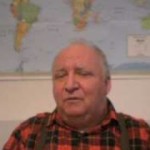Buckminster Fuller
INSPIRATIONAL, 30 Nov 2015
Prof. Dietrich Fischer – TRANSCEND Media Service
Buckminster Fuller (1895-1983) studied aerospace engineering, and later changed to architecture. One morning he decided to figure out how a house would look like if it was built according to the principles he had learned in aerospace engineering. The basic injunction was, “Do more with less,” get the maximum in strength with the minimum of weight. A plane would never be built as a rectangular box like a typical house, but round, like an eggshell, which is sturdier than if it had sharp corners.
Bricks, the typical building material, serve a dual function: insulation, and structural support. For insulation against the cold outside, it is not necessary to use something as heavy as a brick. A much lighter material that traps air, like cotton or glass fiber, can meet that need just as well. Moreover, for structural support, it is not necessary to build a solid wall; a grid made from metal tubes can provide that support. If the grid elements are quadrangles, the angles could easily be bent out of shape, but a triangle is the sturdiest shape.
This gave him the idea of building a dome made out of a triangular grid, covered with plexiglass–the geodesic dome. He found that to enclose the average space of a one-family home, a dome would use about 3 tons of construction material, compared with 150 tons for traditional buildings, a 98 percent saving. He was intrigued, and began to look into other areas where better design could help save on material inputs and energy.
He estimated that if existing engineering knowledge was applied systematically to meet human needs, even without counting on new inventions, within ten years, everyone on earth could enjoy a living standard as good as or better than people in the most advanced industrial countries.
Of course, this would not mean the same level of wasteful material consumption, but adequate nutrition, shelter, access to information, health care and education. He concluded that the obstacles to such a dream were not technical but political.
____________________________
Dietrich Fischer (1941-2015) from Münsingen, Switzerland, got a Licentiate in Mathematics from the University of Bern 1968 and his Ph.D. in Computer Science from New York University 1976. 1986-88 he was a MacArthur Fellow in International Peace and Security at Princeton University. He has taught mathematics, computer science, economics and peace studies at various universities and been a consultant to the United Nations.
Excerpted from Dietrich Fischer’s Stories to Inspire You – TRANSCEND University Press-TUP.
This article originally appeared on Transcend Media Service (TMS) on 30 Nov 2015.
Anticopyright: Editorials and articles originated on TMS may be freely reprinted, disseminated, translated and used as background material, provided an acknowledgement and link to the source, TMS: Buckminster Fuller, is included. Thank you.
If you enjoyed this article, please donate to TMS to join the growing list of TMS Supporters.

This work is licensed under a CC BY-NC 4.0 License.
